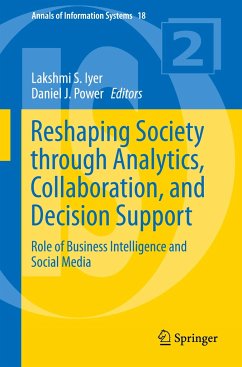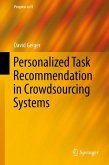This volume explores emerging research and pedagogy in analytics, collaboration, and decision support with an emphasis on business intelligence and social media. In general, the chapters help understand where technology involvement in human decisions is headed. Reading the chapters can help understand the opportunities and threats associated with the use of information technology in decision making. Computing and information technologies are reshaping our global society, but they can potentially reshape it in negative as well as positive ways. Analytics, collaboration and computerized decision support are powerful decision aiding and decision making tools that have enormous potential to impact crisis decision making, regulation of financial systems, healthcare decision making and many more important decision domains.
Many information technologies can potentially support, assist and even decide for human decision makers. Despite the potential, some researchers think that we know the answers to how these technologies will change society. The "Wisdom of Crowds" or "Big Data" become the topic of the day and are soon replaced with new marketing terms. In many ways, mobile technology is just another form factor to adapt decision support capabilities too and experiment with new capabilities. The cloud is a nebulous metaphor that adds to the mystery of information technology. Wireless technology enables the ubiquitous presence of analytics and decision support. With new networking capabilities, collaboration is possible anywhere and everywhere using voice, video and text. Documents can be widely shared and massive numbers of documents can be carried on a small tablet computer. Recent developments in technologies impact the processes organizations use to make decisions. In addition, academics are looking for ways to enhance their pedagogy to train students to be more adept in understanding how emerging technology will be used effectively for decisionmaking in organizations.
The chapters are based on papers originally reviewed at the Special Interest Group on Decision Support Systems (SIGDSS) Workshop at the 2013 International Conference on Information Systems (ICIS 2013). Ultimately this volume endeavors to find a balance between systematizing what we know, so we can teach our findings from prior research better, and stimulating excitement to move the field in new directions.
Many information technologies can potentially support, assist and even decide for human decision makers. Despite the potential, some researchers think that we know the answers to how these technologies will change society. The "Wisdom of Crowds" or "Big Data" become the topic of the day and are soon replaced with new marketing terms. In many ways, mobile technology is just another form factor to adapt decision support capabilities too and experiment with new capabilities. The cloud is a nebulous metaphor that adds to the mystery of information technology. Wireless technology enables the ubiquitous presence of analytics and decision support. With new networking capabilities, collaboration is possible anywhere and everywhere using voice, video and text. Documents can be widely shared and massive numbers of documents can be carried on a small tablet computer. Recent developments in technologies impact the processes organizations use to make decisions. In addition, academics are looking for ways to enhance their pedagogy to train students to be more adept in understanding how emerging technology will be used effectively for decisionmaking in organizations.
The chapters are based on papers originally reviewed at the Special Interest Group on Decision Support Systems (SIGDSS) Workshop at the 2013 International Conference on Information Systems (ICIS 2013). Ultimately this volume endeavors to find a balance between systematizing what we know, so we can teach our findings from prior research better, and stimulating excitement to move the field in new directions.








